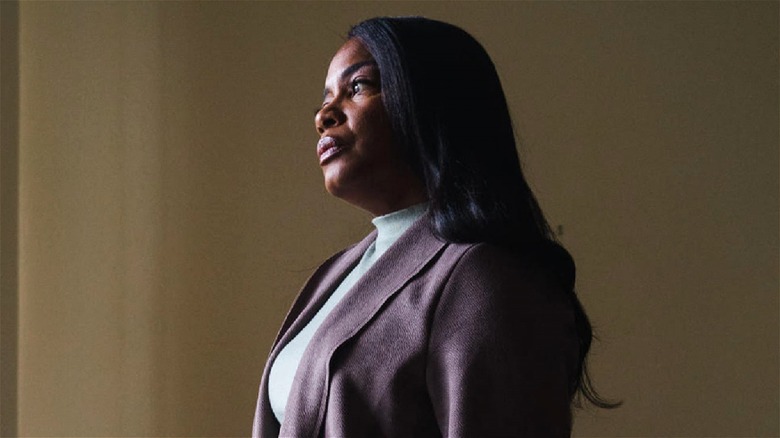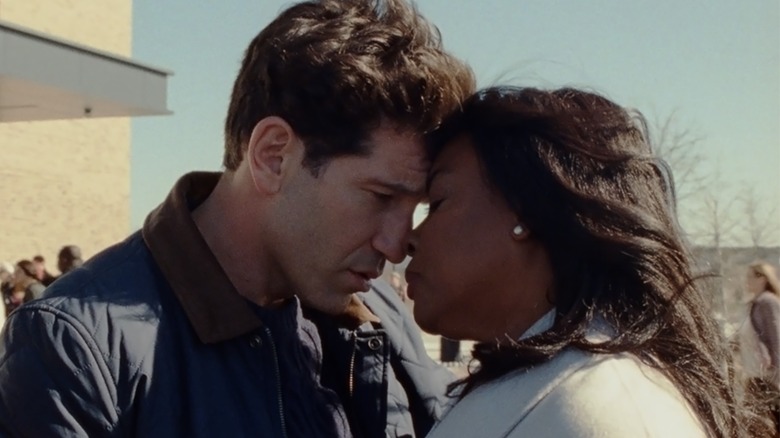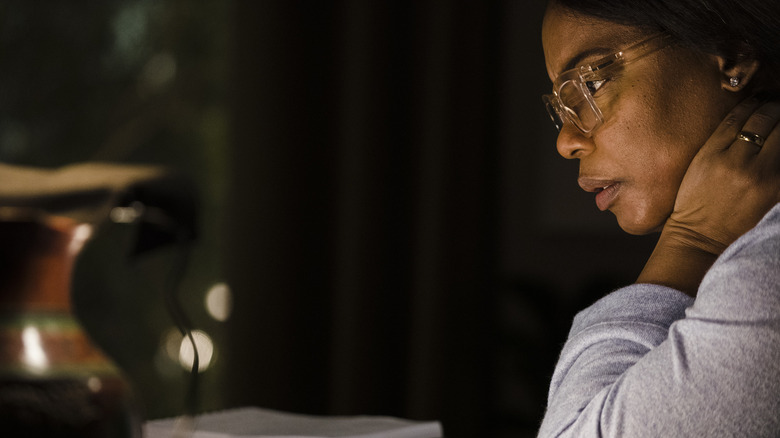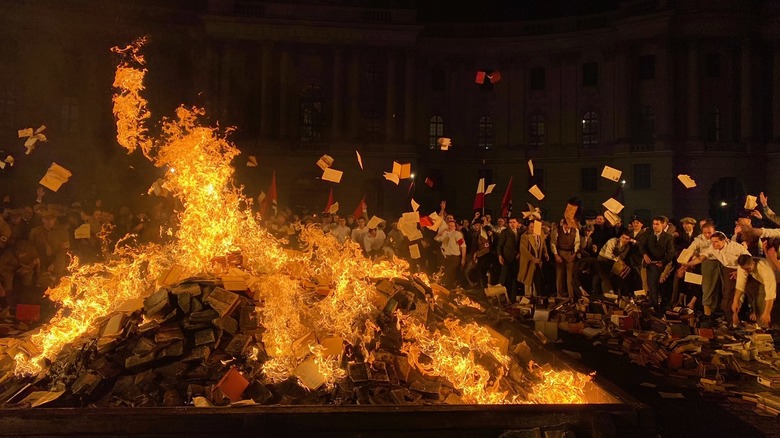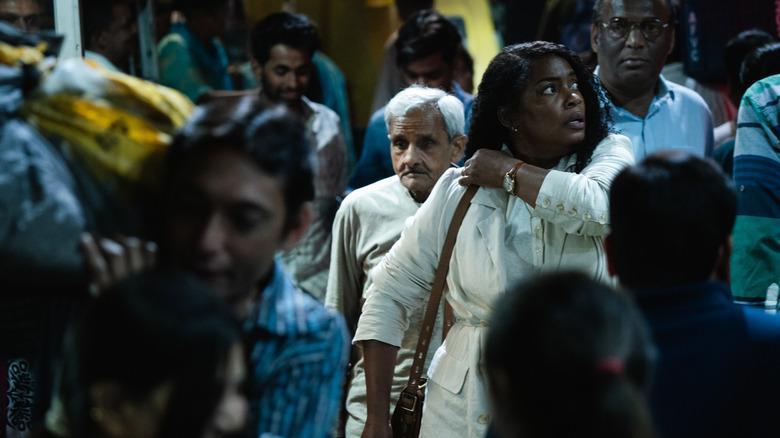Why Origin's Aunjanue Ellis-Taylor Calls Her Character A 'Literary Indiana Jones' - Exclusive
In 2020, journalist Isabel Wilkerson published "Caste: The Origins of Our Discontents," a groundbreaking book in which she theorized that racism in the United States was actually one aspect of a larger, more sweeping caste system — where one societal group consistently pushes another to the bottom of the social hierarchy, using them as labor, denying them basic rights, and painting them as scapegoats for other societal ills.
Wilkerson's work pointed to India's treatment of its Dalit (marginalized people once known as "untouchables") and Nazi Germany's treatment of Jews in the 1930s — both cases in which color had nothing to do with their subjugation — along with the treatment of non-white people in the U.S. While traveling around the world to research "Caste," Wilkerson was also dealing with profound grief as she lost the two people closest to her — her mother and husband — within a year of each other.
Filmmaker Ava DuVernay (director of "Selma" and "When They See Us") read Wilkerson's book and wanted to get its message out to the world, while also telling Wilkerson's personal story at the same time. The result is "Origin," a unique hybrid of biopic and historical document that traces Wilkerson's journey through loss while also chronicling the researching and writing of "Caste."
At the heart of "Origin" is actor Aunjanue Ellis-Taylor, who starred in DuVernay's "When They See Us" and earned a best supporting actress Oscar nomination for portraying Oracene Price, mother of Venus and Serena Williams, in 2021's "King Richard." Playing Wilkerson became something of a heroic quest for Ellis-Taylor. "In this search for this truth, she experiences great loss that tears her apart, but in turn heals her," she tells Looper. "That journey that she goes on, she discovers something that could save us all."
Landing the role of the very private Isabel Wilkerson
What was Ava's pitch to you on this and, conversely, what was your pitch to her to play Isabel?
Aunjanue Ellis-Taylor: Ava didn't have to pitch anything to me. I had to do a little pitching myself ... I knew that she was adapting the book. I knew Ms. Wilkerson by reputation. I was reading [Wilkerson's first book] "The Warmth of Other Suns." Actually had been reading "Warmth of Other Suns" and never finished but was reading it actively. And then, last fall, I heard that [DuVernay] was in the process of casting. I said, "Well, okay." I remember how I felt when I found out she was going to adapt the book. I said, "I would love to be a part of something like that. That's going to be huge. I would love to be a part of that, but that'll never happen in my life. Things like that don't happen to me."
When I found out that she was casting it, my agent told me about it and I looked at a picture of Ms. Wilkerson and I said, "I can make myself look like her. I can make myself look like her." I showed it to my sister, my sister agreed, and then we went about trying to recreate this famous photo, a photo of Ms. Wilkerson. We did that. We did all the things and sent it to Aisha Coley, who was the casting director. We put it side by side, Ms. Wilkerson and me side by side, and then Aisha Coley sent a picture to Ava, and then Ava and I started talking. I wasn't cast yet, but we started talking.
You didn't have contact with Ms. Wilkerson yourself.
No.
Is that a choice on your part or was that something that also lined up with what you knew about her and her preferences?
By the time I became a part of the film, Ava and she had developed this working practice where she just essentially said, "It's yours. You do with it what you will." I respected that. I didn't want to invade her space. I tried to respect her privacy, so I didn't talk to her.
Is that something that you maybe prefer so that you can create your own character and not necessarily feel like you have to be a certain way?
Yeah. I haven't done that a whole lot, with the exception of playing Yusef Salaam's mother in "When They See Us," and Oracene Price, Venus and Serena Williams' mother [in "King Richard"]. I talked to her maybe a little bit but not a whole lot. I listened to recordings of her. That was where my research came from.
I haven't had the experience of extensive discussions with someone that I'm playing. I haven't had that. I've had to pull from these other research sources, other sources, and I don't mind that. I'm okay with that. I see them as fiction. I'm playing a fiction. I'm not a documentarian. I am playing a character. When I get my hands on it, they are a character. I'm not trying to mimic someone. I'm not trying to recreate something. I am playing a character in a fictionalized portrayal and I lean into that.
Reading the book was a mind-blowing experience
What were your thoughts on the book itself, "Caste," and the theories that Ms. Wilkinson put out there in the book?
I was mind-blown. It is such an incredibly detailed — I recommend everybody to read that book. I know not everybody loves nonfiction, I'm not a big fan of it myself, but this is a special book. I think people, when they do read it, it is stunning, just knowing things. Her development of her argument for caste, these eight pillars of caste, and some of these things with some of these pillars reflect my experiences living in Mississippi, living in a Confederate and now a neo-Confederate state. It explains that in a way that I have not had the language before — or not the language, but the understanding of what something is, knowing I'm being told something. She gives me an understanding of what something really is.
And then, knowing that the Nazis studied Jim Crow America and Jim Crow policies for the blueprint for what happened in Germany before the Holocaust. They studied us to figure out how to do it. That's stunning. I guarantee you, most people don't know that. I was incredibly impacted, educated, my mind was blown open by what I learned.
How would you describe the film? It is, for lack of a better word, a biopic, but it is also a historical document and it's also something that you as the filmmakers want to make cinematic and entertaining for people.
When you have these conversations with folks who write about the film, you have to compress things. I'm like, "Okay, how do I do that with this? How, good God?" Because it's so much. I arrived at this idea that Isabel Wilkerson, the character in the movie, is a journalistic Indiana Jones. She's a literary Indiana Jones, who is on this worldwide quest to understand the truth about who we are and why and how we put each other in these divisions that separate us and tear us apart. And in this search for this truth, she experiences great loss that tears her apart, but in turn heals her. That journey that she goes on, she discovers something that could save us all.
Dealing with grief, loss, and power
Isabel throws herself into her work, even as she's dealing with these terrible personal losses. Is that something you could relate to in terms of your own life? Has work been there for you as a support system if other parts of your life were proving to be challenging?
Yeah. I live with grief. I think we all are living with grief now within the time of the pandemic. We are still in that time, having lost so much. If you haven't lost someone you know — I don't know who that is who hasn't lost someone they know — if you haven't lost someone you know, what you do understand is losing your way of life, losing your freedom. We all lost that. We'll never have that innocence back again, if you could call it innocence. But we'll never have that feeling or that being able to take for granted that our lives could go uninterrupted. We will never know what that's like again. We all have that. We all are carrying that grief. I think that's a great connective tissue that is in the film that we all bring with us.
Watching the scene of the Nazi book burning in the '30s, I flashed to Charlottesville and those men with their horrid tiki torches, plus the ongoing bans on books and academic studies in states like Florida and Texas. Do you think a film like "Origin" or a book like "Caste" can help change the conversation? Because it feels like we're sliding back down that slope again.
Yeah, and actively choosing ... I think so, because what the book does and what the film does, it's an invitation for us to discuss the themes in the book, what Ms. Wilkerson is arguing about, that caste is the thing that connects us, not just in this country but worldwide, but also brings us into an awareness that we have run from.
A part of that is an acknowledgment that when we go into the polls to vote as citizens, some people go to vote because they are trying to make this country more responsive to the poor or the impoverished. We go in the ballot boxes with those intentions. But then there are some people who go [to] the ballot boxes with the intention to maintain power that is connected to the color of their skin. It's important that we understand that and that we confront that and that we bring that to [the] fore and talk about that, because that's an incredible imbalance that some people are going to the polls for very, very different reasons.
That needs to be confronted. If someone is going to the polls to vote for someone not because they're good or not because they think they'll do a good job, but just [so] their presence in office maintains their power, that's something that needs to be confronted.
Oscar campaigns and guerilla filmmaking
You're in two films that are in the Oscar race this year, this one and "The Color Purple." What are your thoughts on Oscar campaigning in general, and do you feel like "Origin" has maybe a heavier lift because it's an indie production?
Absolutely, it does. There are very few films that can break through that. Listen, if you have millions and millions of dollars to promote a film, God bless you. I've been a part of one of those films where they just have money, money, and it is just so much easier. I've seen both sides of it, and we just don't have that. We don't have that. We don't have that engine. We don't have that machine.
It's been very hard to get people to pay attention to us. I think people are paying a little bit more attention now, but I don't know if it's enough to make us really pierce that for that other thing to happen. It's very hard. It's a little capitalistic. There's no way around it. If you got millions and millions and millions of dollars to promote something and to put it out there and put it out there and put it out there, when you don't, it's hard to compete with that.
This was guerilla filmmaking from the start. You filmed in three countries in 37 days. What was that journey like for you?
I never had time to think. I just didn't have time to think. Thank God I didn't have time to think. I arrived in India on my birthday and I had never been to India before. It was a state of wonder, a state of constant wonder. Berlin is just a city that is driven by art. Art is everywhere. Museums are everywhere. We were shooting sometimes, a lot of times, without permission and just capturing things when we could. I love that stuff. I had a ball doing that.
"Origin" is out in theaters now.
